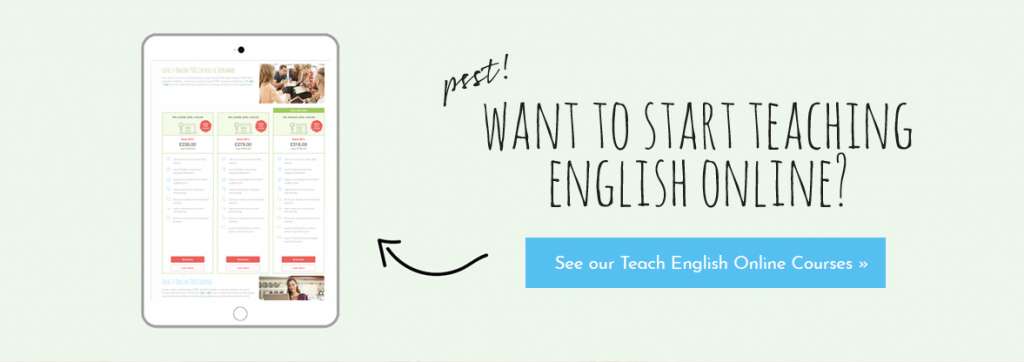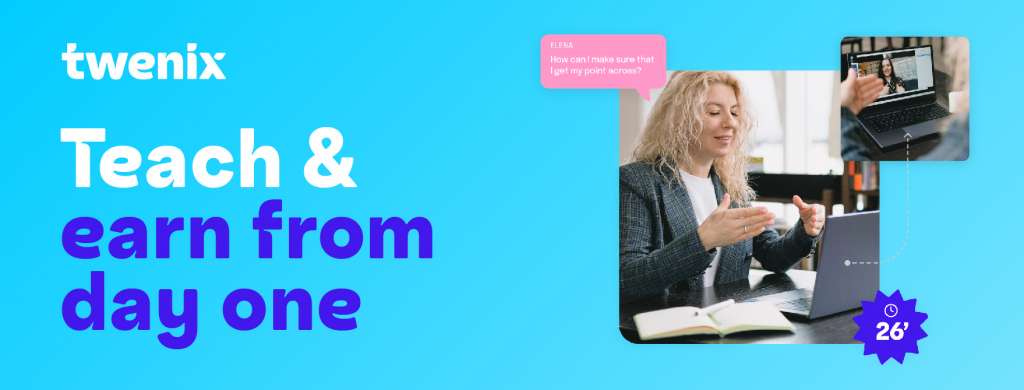Want to TEFL online without a degree? Online English teaching has become a lucrative and flexible way to earn a living. Many people teach from home full-time, while others use it as a side hustle to fill gaps in their timetable and earn additional income. However, many online platforms require applicants to hold a bachelor’s degree, something which can rule out a lot of potential teachers. But fear not! I’ve got some top tips to help you launch your online teaching career without a degree.
1. Get TEFL-Certified
Some online teaching platforms, such as Twenix, don’t require their teachers to hold a degree or be TEFL-certified. However, to really stand out from the crowd during the selection process a TEFL certificate like the ones on offer at i-to-i can really help.
A TEFL course will give you the skills and knowledge to really help your students reach their language learning goals, something that will ultimately be reflected in your teacher ratings and earning potential.
During the application process for many companies, you’ll be required to record a demo video of you “teaching” a class. Being able to show an understanding of sound principles of language learning on your tape will really give you a leg-up over other candidates.

2. Be Fluent in English
Twenix is one of a number of online teaching platforms that hires teachers from English and non-English speaking countries. I mean, at the end of the day, what matters more important? Where you were born or how well you develop your students’ English language skills? That being said, TEFL teachers from non-English speaking countries are expected to speak and write at a fluent level. So, make sure your English skills are on point before applying.
3. Leverage Your Relevant Experience
It’s the classic catch-22 situation! You’ve got your TEFL certificate, but no experience and all the job ads say “minimum 1 year’s experience required”; so, what do you do? Well, think carefully about your work experience. I’m sure you’ve got some of the relevant soft skills to make an excellent teacher. Think about times when you’ve mentored someone or given feedback, led a meeting or given a presentation, listened to and empathised with a friend or colleague. A big chunk of being a good TEFL teacher is being an empathetic, supportive, and encouraging presence in the classroom.
And don’t just stop with the soft skills. Teaching business English or English for specific purposes, such as medicine or law, can be very lucrative niches for the online TEFL teacher/entrepreneur. So, if you’re transitioning into English teaching from another sector, be sure to highlight your experience in your CV. For example, at Twenix, all of our students are adult professionals working in sectors as diverse as health insurance, logistics, the film industry and IT. So, all that knowledge and vocabulary you’ve built up in your previous career might be a very valuable string to your bow.
4. Do Your Homework
It’s important make sure that you fulfil the job requirements before applying for the online teaching role. Some companies, for example, will only hire teachers who hold passports from specific English-speaking countries. So, make sure you check these restrictions carefully before putting all the effort into preparing your application.
Also, read the small print about what each company requires of their teachers. On some platforms you are required to teach a minimum number of hours a week. While with others you’re not paid for your first class with a new student.
Another thing to consider is the type of platform the company offers. Some platforms are open marketplaces where teachers are required to set their prices and market themselves to get students and classes. On other platforms, such as Twenix, teachers are automatically matched with students based purely on their availability. You just open up slots in your timetable when you want to teach and the system will pair you with students who want to do classes at those times.
5. Tailor Your Application
As with all jobs, it’s important to tailor your application to the specific company. At Twenix, for example, as I mentioned, all the students are adults, so, as great as your puppet theatre rendition of “Old McDonald” might be, it’s not really what they’re looking for! Try to get as much information as you can on the profile of the learners you’re likely to be teaching so that you can show how good a fit you would be. Remember that the recruitment departments in these companies process 1000s of video applications a week, so make sure you read the brief carefully and choose the appropriate tone.
6. Get the Right Kit
To teach online you’re going to need: a stable internet connection, a good quality webcam, a microphone and fast Wi-Fi. Most decent new laptops should do the job, just make sure you’re not being let down by faulty or decrepit hardware!

7. Be Patient & Look After Yourself
Getting a job in the first place might take some time; the application process for most platforms consists of several stages. Also, if you do choose to go with a “marketplace” provider, it’ll take time and effort to build up a solid student base and a good average rating.
It’s also important not to run before you can walk. If you’re new to teaching, don’t bite off more than you can chew by taking on too many classes. Even if an online class is only an hour long, it’s an intense hour of constant concentration, which can be particularly draining. If you can afford to, start off small with 10-12 hours a week and see how well you handle it. Balancing your prep time, correcting homework and actually teaching the classes can be tricky in the beginning so be kind to yourself. Think of it like weight training, start light and build up gradually until you find a rhythm and a workload that suits you.
8. Consider Working for Twenix!
If you’re looking for full time teaching work, or just a side hustle, Twenix could be an excellent option. Here are some things that set us apart from some of our competitors:
- Ultra-flexible schedule: You choose exactly how much or how little you want to teach; just open up time slots when you’re available and we’ll match you with students.
- Class transfer policy: What if something comes up and you can’t teach a class for whatever reason? At Twenix you can transfer your classes to other available teachers with no penalties.
- Earn from day one: Once you’re onboarded and activated on the platform you can start earning right away; no need to set up a profile or market yourself to students. Just log on and teach.
- Adult students: Don’t fancy teaching a class full of screaming kids or moody teenagers? With Twenix there’s no need to worry; all of our students are adult professionals from Spain and Italy.
- No prep, no marking: Twenix provides you with all the lesson materials you’ll need for class. They’re designed so that you’ll only need 2-3 minutes before class to read over the lesson plan before teaching it. Also, you don’t need to set or mark any homework! Just focus on teaching.
- Open hiring policy: Unlike other platforms, we hire teachers from all over the world, no need to be a native speaker, hold a degree or a TEFL certificate. If you’ve got the passion for teaching and a willingness to learn, we want to hire you.
- Competitive rates: Our pay rates vary from country to country, for the US our hourly rate ranges from $13-$16. Also, the longer you work for us, the more you earn; your pay rate increases as you level up on the platform.
If working for Twenix sounds appealing, click here to find out more.
The post Teaching English Online: No Degree? No Problem! appeared first on i-to-i TEFL.




